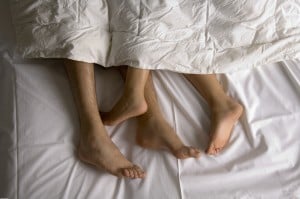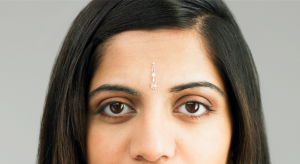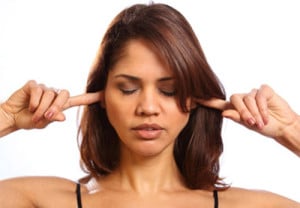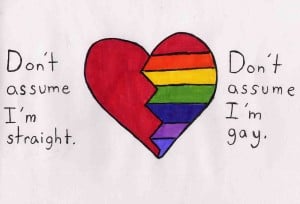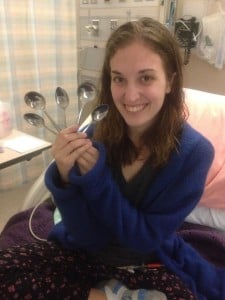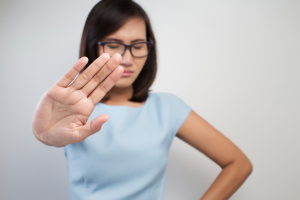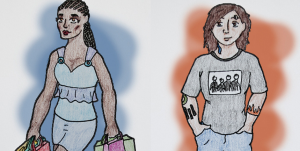
Source: The Daily Record
Do you ever feel like thoughts about food and weight are starting to control your life? Do you believe that if you eat certain types of “bad” food that you need to punish or purge yourself by not eating later or exercising in excess to make up for it?
Has your obsession with weight and food become so all-encompassing that your quality of life has started to decrease? Do you feel hopeless and misunderstood when people tell you to “just eat right and exercise moderately?”
Do you become agitated and flippant when loved ones insinuate that you might have a problem? Are you worried that they might try to sabotage your weight loss plan?
If you answered yes to any of the questions above, you may have already begun asking yourself if you have an eating disorder.
And the truth is that it can be downright scary to look down that path.
Part of why we feel so scared to get help for having an eating disorder – to admit it to ourselves, to talk to other people about it, and to get professional help – is that there is a stigma around it.
Because like this article on eating disorder stigma points out, “If I caught the flu, I’d tell my doctor, take medicine, drink some ginger ale, and stay in bed. When I had anorexia nervosa, I didn’t tell my doctor because I was too ashamed to tell a medical professional that I had a medical condition that needed medicine and physical and mental treatment.”
We can’t let that stigma stop us from getting the help that we need.
Breaking down that first barrier is a difficult thing, but it’s an important step.
So let’s explore, together, what eating disorders are and how to get help for them.
Eating Disorders 101
Eating disorders are widespread in our thin-obsessed society, but regularly ignored and downplayed, which make them very dangerous, both emotionally and physically.
The National Eating Disorder Association (NEDA) tells us that disorders such as anorexia and bulimia nervosas and binge eating disorder consist of extreme emotions, attitudes, and behaviors surrounding weight and food – and can have life-threatening consequences.
Because they are complex mental illnesses that come with an array of psychological, sociological, and physiological factors, eating disorders (also known as ED’s) are more difficult to treat than many other illnesses.
And contrary to popular belief, they also don’t discriminate. They can be found across all races, genders, sexual orientations, and socioeconomic backgrounds.
You can learn a lot about how to spot an eating disorder in yourself or in a friend by doing research and behavior analysis. What is harder to learn through solitary research is how to actually deal with having an eating disorder on a daily basis – and more importantly, how to recover from one.
You’ve Established That You Have an Eating Disorder – What’s Next?
Admitting to yourself that you have an ED and that you want to get better can be extremely challenging, but is absolutely necessary for long-term recovery.
And if you’ve gotten to that point – which might even be why you chose to read this article – we want to congratulate you.
It takes a lot of strength to get to a point with body image and eating issues where you’re brave enough not only to admit that you might have a problem, but that you want to seek out more information and even help.
It’s amazing to come forward like that.
But even figuring out whether or not your thoughts and behaviors qualify as disordered can be hard to establish.
Amazingly, NEDA has recently come out with an online screening process to see if one’s experiences are in line with the symptoms of an eating disorder. You can check it out here.
Answer the questions, and see what the results tell you. Keep in mind, though, that even if the results say it doesn’t sound like you’re suffering from an eating disorder, it’s still worth talking about getting help for the issues that are being experienced.
So if you’re at the point where you’ve accepted that you might have an eating disorder and are ready to seek help, there are a number of ways to begin your path to recovery.
Different approaches work for different people, so keep an open mind when reviewing your options.
1) See a Doctor or Nutritionist
Seeing a doctor or a nutrition specialist can be a great first step.
These professionals can tell you exactly what vital nutrients are missing from your everyday life, how that is affecting you, and how to work them back into your diet. They can also help you figure out ways to fuel your body in a healthy way, without feeling sluggish.
It’s important to remember that doctors are there to help you be a happier, healthier person, not to judge or shame you. If you fear that a medical professional will make you feel worse – or if you experience this – know that you can always choose to see another doctor.
See a doctor who will validate your experience and offer you resources and options.
This type of basic medical intervention can help people with ED’s realize the ways in which they are damaging their bodies and help them move towards a healthier lifestyle.
2) Seek Therapy Options
Therapy can often be an important part of recovery as well.
Therapists who have trained specifically to help their patients deal with and overcome eating disorders are usually the best choice.
Find out what is covered on your health insurance plan, and look for recommendations from previous patients. A good therapist who understands eating disorders could mean a world of difference.
Even if you don’t have health insurance, you have options. Many mental health programs nationwide offer therapy services at little or no charge. They just take some researching to find. Call or visit your local Department of Public Welfare for more information.
And remember that you can also talk to a counselor at school or another community organization.
Explain your situation. Let them know what kinds of thoughts and behaviors you’re experiencing and what your fears are.
3) Join a Support Group
Talking to survivors of eating disorders in a group setting can be helpful for those trying to get better.
For some, an online support group may feel less intimidating, and there are a lot of recovery-specific blogs out there to help you build community, to feel less alone, and to feel inspired, given what other people are going through.
Finding an appropriate online support group can pose some difficulty, though: A lot of spaces that claim to be dedicated to recovery are actually pro-eating disorder sites in disguise, especially now that many social media platforms are cracking down on thinspiration. So please, when looking for online support, do so with caution.
If you’re not sure where to start, try Recovery Is Beautiful, Life Without ED, and The Love Yourself Challenge on Tumblr. They offer posts to boost positivity, facts about eating disorders and other mental illnesses, tips and tricks for dealing with fears, and also help and support if you want to write in.
If Tumblr isn’t your thing and you’d rather explore YouTube for community and inspiration, check out Arielle Lee Bair and her channel Actively Arielle: A Voice with a Commitment here. She’s an eating disorder survivor and specialist who posts weekly videos about prevention and recovery.
But remember that there are also a number of real-life, in-person groups that meet across the country. With the support of a larger community, a person suffering from an eating disorder can hear testimonial from people in recovery as well as from others currently in their position.
Not sure how to find a group? The Alliance for Eating Disorder Awareness has a helpful directory of support groups to choose from. Other useful resources include Eating Disorders Anonymous and ANAD (which includes a state-by-state listing of support groups).
Try attending a meeting, whether in person or online. If it doesn’t work for you, try a different group – or choose to decide that group therapy isn’t for you.
Remember that recovery varies for every person, so what worked for a friend may not work the same way for you.
4) Consider Medication
For some people, taking an anti-depressant or other mood-stabilizing medication can be incredibly helpful when dealing with an eating disorder – especially when combined with psychological counseling.
Anti-depressants can help reduce anxiety, obsessive thoughts, and depression in eating disorder patients; they can even reduce physical symptoms such as binge eating and vomiting. Talk to your doctor about anti-depressants to find out more about your options.
In some cases, other medications may be necessary to help deal with the health consequences of eating disorders – make sure to tell your doctor about all of symptoms you are experiencing so that they can make an educated decision.
5) Create and Educate a Support System of Family and Friends
Educate your family and friends about the disorder that you are struggling with, so they know how to support you during – and beyond – your recovery.
Simple online toolkits, such as this one from NEDIC, can be a good place for relatives and friends to start. By learning about eating disorders, they will be better equipped to help you during your journey and can become more aware of societal triggers that might make things more difficult.
While it can be scary for your loved ones to hear that you are suffering from an eating disorder, starting an honest dialogue about the issue will be beneficial to everyone involved and help you feel less alone.
Let your support network know that you recognize that you need help, are ready to actively find it, and would like their educated support while you do so.
6) Be Forgiving of Yourself – and Have a Plan
There may be times during the recovery process that you feel yourself backslide. This is normal, and it is okay.
Making sure that you have a contingency plan for such times will help. This plan might include multiple key players such as members of your family and friend group, your therapist, ED survivors from a support group online or in your community, and anyone else who is willing to put in the time and effort to help you resist relapse.
It’s comforting to know that people are there for you if you feel yourself slipping back into old habits. And having a plan to deal with a setback can make a hopeless-feeling situation much brighter.
—-
There was a period when we couldn’t see the light at the end of our ED tunnels. But with time and effort, our support systems and individual determinations helped us reach a healthy, happy place.
Remember – just because you are struggling with an eating disorder right now doesn’t mean that the feelings of hopelessness and depression will last forever.
With the right amount of support, hard work and determination, you can live a normal life again.
The most important thing is understanding that regardless of the specifics of your situation, if you feel like you need help, then you deserve to get help.
So figure out what kind of help that you think that you need, and go forth with the confidence to seek it out.
You’ve already done the hard part.
[do_widget id=‘text-101′]
Melissa A. Fabello, Managing Editor of Everyday Feminism, is a domestic violence prevention and sexuality educator, eating disorder and body image activist, and media literacy vlogger based out of Philadelphia. She enjoys rainy days, Jurassic Park, and the occasional Taylor Swift song and can be found on YouTube and Tumblr. She holds a B.S. in English Education from Boston University and an M.Ed. in Human Sexuality from Widener University. She can be reached on Twitter @fyeahmfabello. Read her articles here and book her for speaking engagements here.
Danica Johnson is a Contributing Writer at Everyday Feminism and the Communications Manager at the Coalition on Human Needs, an alliance of national organizations working together to promote public policies addressing the needs of low-income and other vulnerable populations. Living in Washington, DC, this West Coast native uses her free time to write for her blog Duckyfem, practice yoga and spend as much time with animals and in nature as possible. Follow her on Twitter @duckyfem and Read her articles here.
Search our 3000+ articles!
Read our articles about:
Our online racial justice training
Used by hundreds of universities, non-profits, and businesses.
Click to learn more







